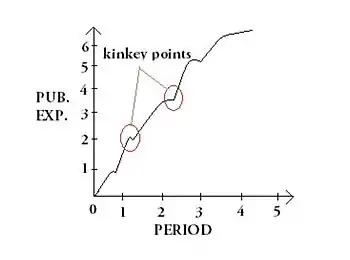華格納法則
華格納法則(英語:)是德國經濟學家阿道夫·華格納提出的理論,認為政府支出會隨著產業工業化而成長。

Graph showing kink in increasing public expenditure in The "Peacock-Wiseman Hypothesis".[1]
理論
- 經濟富裕增加政府稅收,連帶促進政府增加支出。
- 人口增加、都市密集化、依賴人口增加,政府介入社會活動是必然的結果,政府支出勢必大幅增加。
- 政府成長是為回應工商業界擴張投資的需求,國家必須提供產業必須的資金以應技術升級、經濟規模、對外競爭等超出私部門的大量資本需求。
參考
- Singh, S.K. . S.Chand. 2008: 35. ISBN 81-219-1091-9.
This article is issued from Wikipedia. The text is licensed under Creative Commons - Attribution - Sharealike. Additional terms may apply for the media files.